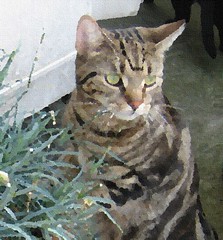At the microscopic level, the Kaliedan oceans, rivers and soils are teeming with life. Much of the bulk of this is composed of
Germulaic lifeforms, analagous of the second creation [note: this means terran] lifeforms known as bacteria, but whose biochemical pathways are matched to the first creation [note: this means kaliedan] biosphere.
Germulas are fairly simple single celled organisms with a basic internal structure. The cells are defined by having a
cell wall - of various materials dependent upon family - which is often tough and flexible.
Cilia and
flagella often protrude beyond the cell wall and are used for locomotion. Many species support this cell wall with an
internal structure, often composed of different materials to that of the cell wall.
Inside the cell wall is found an
inner membrane, whose functions vary but usually include controlling the transportation of molecules across the cell wall and managing chemical balances between the cell matrix and the outside wall. It also plays a role in energy metabolism, particularly energy production (chemically or photosynthetically) and the building of
storage granulas (typically starches).
A second series of membranes -
reactive membranes - can be found throughout the cellular matrix, often wound around the support structures. These are closely associated with the production of many types of proteins and other materials used to build and maintain the cell, and proteins associated with detection of external stimuli. They also play a key role in the transporting of materials across the cell, including signalling chemicals.
DNA is generally in the form of rings and short lengths that bundle together and float freely through the cell matrix (ie there is no nucleic membrane) - at least one such
pseudo-chromosome bundle is present in the cell, though multiple copies are more often found. One bundle will always be found embedded within the reactive membrane and will be the
active pseudo-chromosome controlling the biochemical activity of the cell. The purpose of the other bundles (if present) will vary between species - sometimes they are used during sexual reproduction, or in some species for the hijacking of other cells. In other species the additional pseudo-chromosomes will compete with the active pseudo-chromosome for control of the cell.
Cells do not exist in isolation: rather thay have a proactive relationship with other cells of the same species and of other species, forming a complex web of predation, cannibalism and parasitism. All Germula species posess
protective granulas which float freely within the cell matrix, protected from it by simple lipid membranes. Almost certainly these were originally free-living species of Germula which have evolved a symbiotic relationship with their host. There are probably as many types of protective granulas as there are Germula species, varying in complexity from simple strands of RNA with a few associated proteins to miniature Germula cells that have lost the ability to survive or reproduce outside of the host cell. They all have a key role in defending the host cell from hijack or predation by other cells, and many are capable of other functions such as more efficient waste management or more complex energy storage mechanisms. Most Germula species will have their own type of protective granula - a few granula types are found in more than one species, and a few species have managed to aquire more than one granula type, which manage to coexist within the same host.
Taxonomic divisions within the Germula KingdomKnowledge of the range and diversity of Germula species is incomplete. The sharing of genetic material between species is common, and the web of predation and parasitism is complex. Some microbiologists prefer to think of the whole Kingdom as a single, highly diverse species.
For practical purposes, species are identified according to their physical appearance, the main materials used to build the cell wall and (if present) internal struts, their ability or otherwise to survive extreme conditions, and their key sources of energy and waste products. These characteristics were chosen as they are the least likely to change down the generations.
The Rainbow Germ One of the most intensively studied Germula species is the
Rainbow Germ. This is an organism commonly found in estury muds, noted for its wide tolerance to changes in salinity and its propensity to grow an internal structure using metalled silica (an Si0
2 matrix within which can be embedded atoms or molecules of various metals - in particular nickel and copper, and less frequently palladium, silver, platinum and gold). The major component of its cell wall is cellulose, with bands of acetated cellulose spiralling from the base of the cell to its tip. A flagella with two strands twice the length of the cell is located at the base of the cell. The organism is so common in some esturies that accretions of dead cells form deep sandbanks. Ancient strands of organisms similar to the Rainbow Germ have been mined in some areas, principally to extract copper and nickel.

The organism obtains most of its energy from photosynthesis, principally from the shorter visible wavelengths, giving the cell a green-red shimmer when observed under the microscope - hence its name. It uses the energy to produce a range of starches which are stored throughout the cell matrix in storage granulas, with a particular concentration of granulas around the
flagella root and the
cell spike.
A typical cell will possess two DNA pseudo-chromosome bundles, composed of 8 rings of various sizes joined together by a ninth DNA ring which appears to have a purely structural role. The pseudo-chromosomes do not appear to compete for control of the cell; instead one bundle acts as the active pseudo-chromosome controlling day-to-day metabolism, while the other controls both sexual and asexual reproduction (and is thus known as the
sexual pseudo-chromosome). Both bundles possess a complete inventory of the organism's genetic code.
The Rainbow Germ is an opportunistic parasite of a number of closely related, and a few more distantly related, Germula species. In addition to being able to reproduce asexually by simple division, the organism is also able to hijack other cells.
The hijack follows a similar pattern to sexual reproduction in the species. When two cells come together to mate, they each transfer to the other cell their sexual pseudo-chromosome, via the cell spike. The transferred pseudo-chromosomes then undergo a quasi-mitotic gene swap with the resident active pseudo-chromosome, mediated by a
sexual membrane grown specifically for the purpose. Hijacking follows exactly the same procedure, except that only the Rainbow Germ cell transfers its pseudo-chromosome.
The cell spike plays a crucial role in this process. The tip of the spike is packed with enzymes and RNA snippets which, on being injected into a new cell, rapidly attack and destroy the resident DNA structures. Once this is achieved, the sexual pseudo-chromosome enters the cell and immediately begins to reorganise the cell contents and structure to meet its requirements. Membrane building takes precedence over structural changes and the hijack can take several days to be completed, by which time the pseudo-chromosome will have produced a copy of itself to act as a new sexual pseudo-chromosome.
Sexual reproduction follows the same course, but with both cells impaling each other. Each cell is able to neutralise the other's enzyme attack and subdue the transferred pseudo-chromosome, which then plays a passive role in the gene swap. Once the swap is completed the implanted pseudo-chromosome is destroyed and the active pseudo-chromosome produces a new pseudo chromosome from the remnants of the old.
Many hijack attempts fail, and the Rainbow Germ is in a constant spiral of evolution with its prey as it develops new enzymes and DNA snippets to overcome the attacked cell's defences. The protective granulas, which consist of between 6 and 12 well developed organelles (the
primary protective granulas) and a separate granula set of proteins and mixed nucleic acid chains (the
secondary protective granulas), play a lynchpin role in the Rainbow Germ's own defence system.
The Rainbow Germ does not undergo an
alternation of generations, though it does go through a 4 day inactive phase every 6-8 weeks when the flagella are lost and regrown.





























